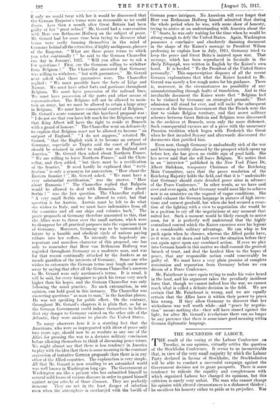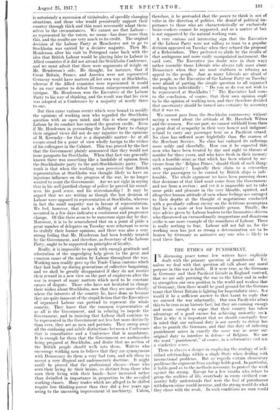THE SOUNDNESS OF LABOUR.
r lIE result of the voting at the Labour Conference on Tuesday, in our opinion, virtually settles the question of the Stockholm Conference. It seems to us inconceivable that, in view of the very small majority by which the Labour Party declared in favour of Stockholm, the Stockholmites will be able to conduct a successful campaign against the Government decision not to grant passports. There is some tendency to ridicule the rapidity and completeness with which organized Labour has changed its opinions, but this criticism is surely very unfair. The man who cannot change his opinion With altered circumstances is a dishonest thinker ; ho sacrifices his honesty either to pride or to prejudice. War .is notoriously a succession of vicissitudes, of speedily changing situations, and those who would persistently support their country through thick and thin must necessarily adapt them- selves to the circumstances. We cannot see that Labour— as repreaented by the voters, we mean—has done more than this, and the results are very much to its credit. The original decision of the Labour Party at Manchester not to go to Stockholm was carried by a decisive majority. Then Mr. Henderson after his visit to Petrograd came back with the idea that British Labour would be playing false to Labour in Allied countries if it did not attend the Stockholm Conference, and we must admit that there were arguments of weight on Mr. Henderson's side. He thought, for instance, that if Great Britain, France, and America were not represented Gernirny would have matters all her own way at Stockholm, whereas if the Allied countries were represented it would be an easy matter to defeat German misrepresentation and. intrigue. Mr. Henderson won the Executive of the Labour Party to his way of thinking, and the result was that his view was adopted at a Conference by a majority of nearly three to one.
But then came various events which were bound to modify the opinions of working men who regarded the Stockholm question with an open mind, and this is where organized Labour by its conduct has earned the greatest credit. Even if Mr. Henderson in persuading the Labour Party to change their original views did not do any injustice to the opinions of M. Kcrensky—for that is a disputable matter—he at all events stood for a point of view wholly foreign to the wishes of his colleagues in the Cabinet. This was proved by the fact that the Government plainly announced that they would not issue passports for Stockholm. When that fact was generally known there was something like a landslide of opinion from the Stockholmite party to the anti-Stockhohnite party. The truth is that when the working man perceived that British representation at Stockholm was thought likely to have an injurious influence on the progress of the war, he no longer wanted to resist the Government. Are we not right in saying that in his well-justified change of policy he proved his sound- ness, his good sense, and his statesmanship ? It . may be argued that we are writing as though the last decision of Labour were opposed to representation at Stockholm, whereas in fact the small majority was in favour of representation. We feel, however, that such a shifting of opinion as has occurred in a few days indicates a continuous and progressive change. Of this there seem to be numerous signs day by day. Moreover, it is to be remembered that on a point of pride a great number of delegates on Tuesday were reluctant to scent to stultify their former opinions, and there was also a very strong feeling that Mr. Henderson had been harshly treated by the Government, and therefore, as Secretary of the Labour Party, ought to be supported on principles of loyalty.
Really, it is impossible to speak with enough gratitude and admiration of the ungrudging help given to the great and common cause of the nation by Labour throughout the war. .Working men readily gave up the Trade Union customs which they had built up during generations of collective bargaining, and we shall be greatly disappointed if they do not receive their reward in a new view on the part of employers after the war in respect of many matters which used to be constant causes of dispute. Those who have not hesitated to change their wishes about Stockholm, now that they see more cleally where the interests of the country lie, have done so because they are quite innocent of the stupid fiction that the Executives of organized Labour can pretend to represent the whole country. They know that the common representative of us all is the Government, and in refusing to impede the Government, and in insisting that Labour shall continue to be represented in the Government not less but more distinctly than ever, they act as men and patriots. They sweep away all the confusing and subtle distinctions between a Conference that is consultative and a Conference that is mandatory. It is enough for them that the Government see ambuscades being prepared at Stockholm, and desire that no section of the British people should walk into them. Writers who encourage working men to believe that they are synonymous with Democracy do them a very bad turn, and ask them to accept a very illogical and undemocratic doctrine. It might easily be proved that the professional classes--those who earn their living by their brains, as distinct front those who earn their living with their hands—have increased rather than dwindled in importance in proportion. to the so-called working classes. Many trades which are alleged to be skilled require less thinking-power than they did a few years ago owing to the unceasing improvement of machinery. Unless, therefore, it be pretended that the power to think is not of value in the direction of politics, the denial of political im• portance to those who are characteristically or exclusively brain-workers cannot be supported, and as a matter of fact is not supported by the natural working man.
A very curious and interesting sign that the Executive of the Labour Party were not willing to trust to a popular decision appeared on Tuesday when they refused the proposal of a Referendum. They preferred to abide by the results of that ambiguous and more easily manipulated instrument, the card vote. The Executive (no doubt wise in . their way) rather resemble those Liberals who always talk most about Democracy when they are most stubborn in refusing as appeal to the people. Just as many Liberals are afraid of the people, so the Executive of the Labour Party on Tuesday were afraid of putting the simple question to all organized working Men individually : " Do you or do you not wish to be represented at Stockholm ? " The Executive had corna to the conclusion, of course, that their own opinion ought to be the opinion of working men, and they therefore derided that uncertainty should be turned into certainty by assumina that it was so.
Wo cannot pass front the Stockholm controversy without saying a word about the attitude of Mr. Havelock Wilson and the seamen. For our part, we cannot withhold front them a great deal of sympathy in their very honeat -and indignant refusal to carry any passenger bent on a Pacificist errand. No class has suffered more frightfully than the seamen of the Merchant Service. No class has endured its sufferings more nobly and cheerfully. How can it be expected that men who have been treated by day and night to threats of murder for three years, and who have fresh in their memory such a horrible story as that which has been related by sur- vivors from the ' Belgian Prince,' should think of suck thing: with • equanimity ? Logically their claim to a (-en-airship over the passengers to be carried by British ships is inde- fensible. The whole argument we have been pursuing shows that decisions of that kind must come from the Government and not from a section ; and yet it is impossible not to take some pride and pleasure in the very likeable, spirited, ani altogether human attitude of men whose feelings are outraged to their depths at the thought of negotiations conducted with a peculiarly callous enemy on the fictitious assumptioa that he is a more or less honourable person. Finally, the wise advice given by Labour leaders to the locomotive-drivers who threatened an extraordinarily inopportune and disastrous strike is one more example of the soundness of Labour. Thera is really nothing to fear. Labour will not fail us, for the working man has just as strong a determination not to hi beaten by Germany as animates any one who i4 likely to read these lines.



























 Previous page
Previous page